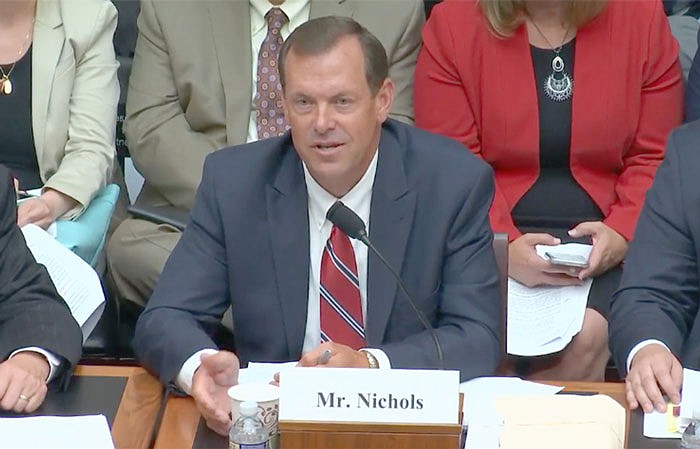The CEO of a Jefferson City credit union told a congressional committee Wednesday afternoon that financial regulations designed to protect big banks from failing are killing small banks and that the U.S. needs banking regulations that help small banks and credit unions.
Rick Nichols, CEO of River Region Credit Union in Jefferson City, told the Financial Institutions and Consumer Credit Subcommittee that current regulations are rigged in favor of big banks.
Rep. Blaine Luetkemeyer, R-St. Elizabeth, chairs the committee and intends to introduce legislation to help small financial service intuitions like River Region Credit Union. Nichols also expressed support for a bill to make online banking easier.
With three locations in Jefferson City, River Region Credit Union has about $200 million in assets and 22,000 members. Nichols testified on behalf of the Heartland Credit Union Association, which represents credit unions in Missouri and Kansas. He told Luetkemeyer and other members of the committee that Great Recession-era protections in bills like the Dodd-Frank Act are hurting small banks.
He also said big banks have an army of compliance attorneys to handle the costly regulations, while his credit union can't afford a large legal team.
"Credit unions, as well as many small banks, are forced to operate in a regulatory environment that is rigged in favor of large institutions," Nichols told the committee. "We're being painted with the same brush of those who commit abuses.
"Over-regulation is leading to a decreased number of small institutions that know their communities and work with the people they serve every day."
An August report by the president's Council of Economic Advisers found 1,708 small banks have closed since Dodd-Frank's implementation.
Luetkemeyer's Community Lending Enhancement and Regulatory Relief Act seeks to give relief to those small institutions. The bill includes more than a dozen changes to current laws he said will enact common sense reforms that will allow community banks to do a better job of serving their communities by lowering their costs of operation because they lower the regulatory burdens imposed on them.
Among the changes included in the bill is a change allowing small banks and credit unions to conduct their own appraisals for mortgages undere $250,000, repeal of the Dodd-Frank provision requiring small banks to submit small business loan data, and make minor changes to the Equal Credit Opportunity Act and the Fair Housing Act. Nichols expressed support for most provisions in the bill.
"We do it in a way that doesn't impact the quality of the exams by the regulators," Luetkemeyer told the News Tribune by phone after the hearing. "We do it in a way that still provides the safety net of oversight by the regulators."
Early in the hearing, Nichols made his point about the need for less regulation when Luetkemeyer asked him how many pages were in a loan application.
"We quit measuring by pages and started measuring by pounds," Nichols told Luetkemeyer, noting the application weighed about 7 pounds.
Afther the hearing, Luetkemeyer and Nichols said streamlining regulations also makes financial products cheaper for consumers.
"The end result is the consumer has better access to credit at a better price," Luetkemeyer said. "Because all of this excess regulation that the bank or credit union has to comply with, comes at a cost."
Nichols said consumers can save money simply because it costs a lot of money to print that many documents.
"That cost has to go somewhere," he said. "So ultimately, it's hurting the consumer."
The committee is also hearing testimony about the proposed Making Online Banking Initiation Legal and Easy Act, or MOBILE Act, which could allow customers to use a picture or swipe of their drivers license to setup checking accounts online or to setup mobile banking remotely.
Nichols said mobile banking needs to be regulated as financial technology takes off. He also thinks it could make it easier for customers in Mid-Missouri to bank, because some people in the region live 20 or 30 miles from a bank. Nichols thinks the MOBILE bill could help underbanked and unbanked people in the region.
"The more ways we can electronically keep them mainstream and provide those services, good choices for people in rural Missouri is a good thing," Nichols said. "I want to make sure everyone has good choice."

